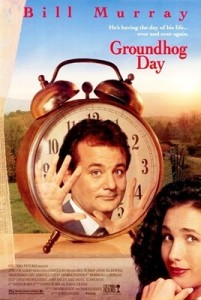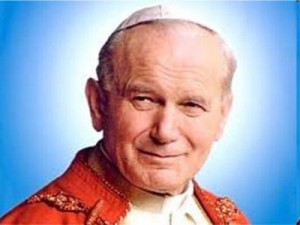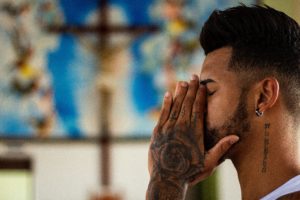
In the classic Bill Murray flick Groundhog Day, Punxsutawney Phil is called a “prognosticator of prognosticators.” Catholics could borrow that phrase and apply it to St. John Paul II because in 1993, he penned an encyclical which even today diagnoses, with incredible specificity, many of the world’s most serious moral crises.
With elections approaching in many parts of the country, it’s a surefire bet that young adults in the Catholic crowd will catch an earful of libertarian ideology, and will be pressured to admit it’s the only party worth following. After all, most of us have realized that the two major parties aren’t ones we can commit to wholeheartedly, and Catholics are all about the via media. So why not follow this hip trend which puts all the emphasis on liberty?
If you’re like me, you may have some trouble putting your finger on just exactly why we can’t commit wholeheartedly. The answer is in that 1993 encyclical, Veritatis Splendor (“The Splendor of Truth”). St. John Paul II, throughout the encyclical, engages with a number of problems that had been festering in moral theology for a number of years.
Amongst those is what he termed a “crisis of freedom.” He noted a two-pronged problem. On one hand, there were those who would raise up freedom without any responsibility attached to it, a freedom that descended into license and ended up in slavery. On the other hand was a group which treated freedom as an impossibility, because (according to them), the world is material and is determined by laws of physics, and so even the illusion of free will must be abandoned.
Now, nobody would accuse the libertarians of wanting to cast aside free will, but the tendency to isolate freedom from any other ideals, and place liberty as the summit of common good is very troubling. Catholics see the issue a bit differently. Here’s how.
In both Catholic social teaching and in our dogmatic theology, we see that freedom cannot be exalted as the one and only idea that we should focus on because freedom has a necessary relationship to truth. That is, freedom exists for the sake of serving the truth. If the relationship between freedom and truth suffers, both freedom and truth lose their proper bearing.
Furthermore, freedom is not merely an absence of rules. That concept treats freedom as a freedom from something, namely restrictions. But Catholic moral theology sees freedom as a force for good, for virtue. We have freedom for the sake of living a holy life. Since we have an end in mind, namely the common good and to serve God, there are boundaries and restrictions, but these serve to help us flourish, not to hold us back.
The classic case of freedom being treated as a mere absence of regulation is in the temptation of Adam and Eve in the Garden. The serpent tells them that God has given them a prohibition against the tree in the center of the garden because He is jealous and does not want them to become like him. Thus the sin of Adam and Eve is not so much that they ate a forbidden fruit, but that they accepted a counterfeit definition of freedom, one divorced from the truth.

This is what St. John Paul II was trying to counteract some twenty years ago. Now, once again, we are facing the same crisis. I know many very well-meaning, intelligent young adults who are sort of star-struck by the libertarian ideal. They rightly see the importance of freedom, but they somehow tend to forget the problem of isolating it. Liberty alone doesn’t work, because it tends to chaos and because it is an overestimation of the importance due to liberty.
What is needed is the critical balance of freedom which is grounded in truth. When the stake is not tied down firmly in God’s truth as born out in the natural law, Scripture, and Tradition, problems will arise. What’s worse is not so much the problems but the fact that the logical end of the primacy of liberty above any other ideals will lead to terrible ends. That’s why some of the “radical” libertarian groups are advocating not just for same-sex marriage (in the name of freedom, of course) but have even taken the ideal further. I have heard and read many make arguments for legalizing any and all drugs, eradicating all forms of government altogether, and even legalizing prostitution.
Those are the kinds of things that logically follow when we have a crisis of truth. As St. John Paul II put it:
Once the idea of a universal truth about the good, knowable by human reason, is lost, inevitably the notion of conscience also changes. Conscience is no longer considered in its primordial reality as an act of a person’s intelligence, the function of which is to apply the universal knowledge of the good in a specific situation and thus to express a judgment about the right conduct to be chosen here and now. Instead, there is a tendency to grant to the individual conscience the prerogative of independently determining the criteria of good and evil and then acting accordingly. Such an outlook is quite congenial to an individualist ethic, wherein each individual is faced with his own truth, different from the truth of others. (VS 32)
Instead of putting liberty at the center, Catholics are reminded that we follow Jesus above all else. That is, we follow Him who said that he was ““the way, and the truth, and the life.” (John 14:6)






2 thoughts on “JPII and the Crisis of Freedom”
In the late 1980’s, St. John Paul II went too far from freedom in the other direction of conformist non freedom of the intellect in the Profession of Faith. The last paragraph of that Profession reads: ” Moreover, I adhere with religious submission of will and intellect to the teachings which either the Roman Pontiff or the College of Bishops enunciate when they exercise their authentic Magisterium, even if they do not intend to proclaim these teachings by a definitive act.”
Compare that with the more moderate stance of Vatican II in Lumen Gentium 25: ” This religious submission of mind and will must be shown in a special way to the authentic magisterium of the Roman Pontiff, even when he is not speaking ex cathedra; that is, it must be shown in such a way that his supreme magisterium is acknowledged with reverence, the judgments made by him are sincerely adhered to, according to his manifest mind and will. His mind and will in the matter may be known either from the character of the documents, from his frequent repetition of the same doctrine, or from his manner of speaking.”
What John Paul did was to take LG25 and extend it to Bishops but remove the requirement of “character of the documents”.. “frequent repetition”.. “manner of speaking”. Now then you must submit your intellect to virtually everything from the magisterium if you take the Profession of Faith. Count me out. Let’s take the new death penalty position of ccc 2267 which I believe will get more people killed by murderers than the Inquisition ever killed (c.5000)…and for which John Paul apologized and I concur with him there.
John Paul in Evangelium Vitae did something odd concerning the death penalty: he repeatedly cited God’s protection of Cain from execution as iconic for us in the public square. Then he saw Gen.9:5-6 in which God gives both Jews and Gentiles a death penalty for murder. We know he saw it because he quotes non death penalty pieces of it three times while he effectively hid from view the death penalty part which repelled him ( for that repulsion, see sect.40 of EV). So John Paul loved God’s protection of Cain and didn’t love God’s giving a death penalty soon after in Gen.9:5-6. He should have read the next chapter (10) of Genesis which solves the contradiction in that it announces that Nimrod was the first potentate on earth.
Voila…God was protecting Cain not from state execution but from non state vigilantes because there was no state in Cain’s day. When that same God is about to create the first state under Nimrod, that same God who protected Cain now gives a death penalty to rulers which is echoed at the end of the Bible by Romans 13:4 and is acknowledged by Christ to Pilate: ” You would have no power over me at all were it not given you from above.”
The new death penalty position then is based on a Biblical mistake. In 1976 the U.S. Supreme Court resumed permission for the death penalty after comparing stat based research of opposing schools on death penalty deterrence. They sided with those studies which found that executions deter not passion murders but premeditated murders like those ordered from prison by gang leaders serving life…as in Catholic Brazil and Mexico which are both 20 times the murder rate of largely death penalty East Asia by UN stats…Catholic Central America is 30 times the murder rate of East Asia.
John Paul made other Biblical mistakes to which I will not give religious submission of intellect. In section 80 of Splendor of the Truth, he stated that slavery is an intrinsic evil. It can’t be though it is sad. It can’t be because God gave it in chattel form to the Jews in Leviticus 25:44 onward..” 44
* The male and female slaves that you possess—these you shall acquire from the nations round about you.
45
You may also acquire them from among the resident aliens who reside with you, and from their families who are with you, those whom they bore in your land. These you may possess,
46
and bequeath to your children as their hereditary possession forever. You may treat them as slaves. But none of you shall lord it harshly over any of your fellow Israelites.”
John Paul went too far with submission of intellect. We are never in the news for converting large swathes of personnel from the best schools in the world. There is a reason for that. A future Pope will reverse in some valid way this religious submission of intellect which currently is overstated to the nth degree.
Pingback: The Real Presence - BigPulpit.com